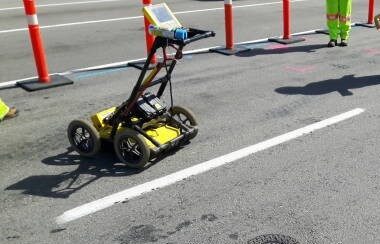Overview
Locating by georadar, also known as Ground Penetrating Radar (GPR), is a tool used to locate underground structures and objects without causing any damage. It can be used to detect utilities such as pipes and cables, and is often employed in surveying teams to locate subsurface utilities.
Project Planning
satisfied Service
Dedicated Team
Benefits of Service
Ground Penetrating Radar (GPR) is used to identify subsurface features and characteristics without the need for excavation. The process involves emitting a radio frequency signal into the ground and measuring the reflections that return to the surface. The reflection data is then used to create a cross-sectional image of the subsurface.
There are several reasons why GPR is a preferred method for utility positioning compared to other methods:
Non-destructive: GPR is a non-destructive method, meaning it does not require excavation or drilling to locate subsurface features. This is particularly useful for identifying utilities in densely populated areas, where excavation can be disruptive and costly.
High accuracy: GPR can achieve high levels of accuracy in identifying subsurface features, especially when combined with other survey methods such as electromagnetic location. This can help to locate buried utilities with a high degree of precision.
Versatility: GPR can be used to locate a wide range of subsurface features, such as metal, plastic, and concrete pipes, as well as other types of underground infrastructure. It can also be used to locate subsurface features in a variety of soil types and ground conditions.
Real-time data: GPR can provide real-time data, which can be used to quickly identify the position and depth of subsurface features. This can save time and money compared to other methods, which may require multiple visits to the survey site.
Cost-effective: GPR is a cost-effective method, as it requires less labor and equipment than other methods such as excavation. It also eliminates the need to repair the ground surface after the survey, thus reducing the total cost of the survey.


